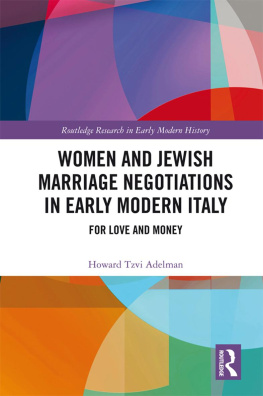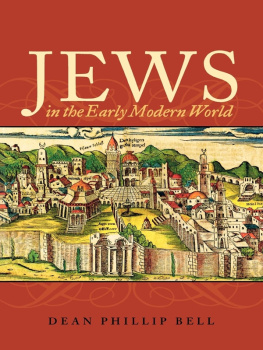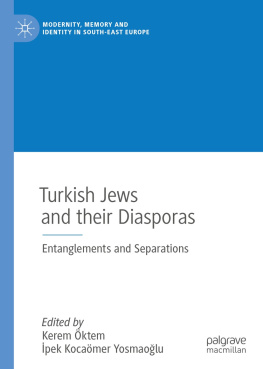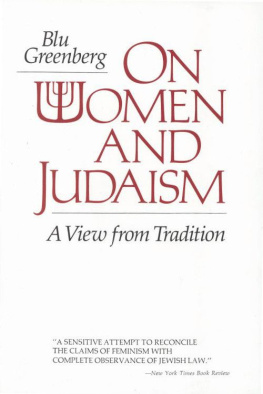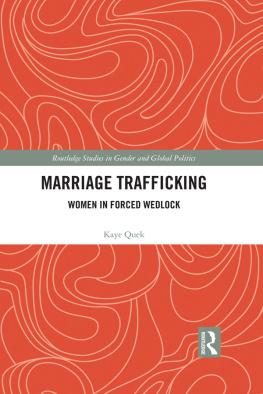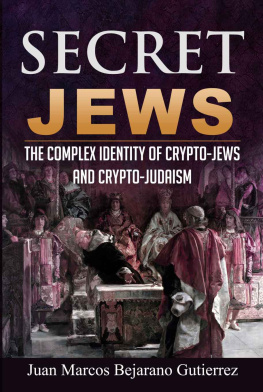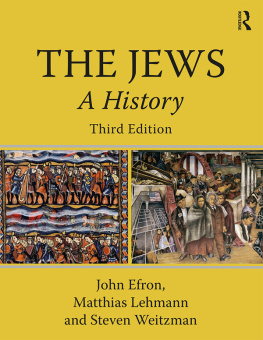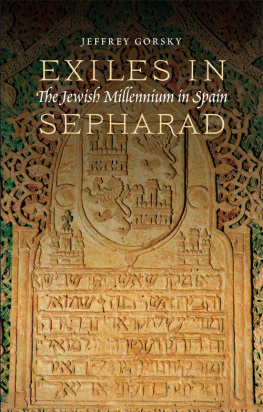Women and Jewish Marriage Negotiations in Early Modern Italy
This book examines the role of women in Jewish family negotiations, using the setting of Italy from the end of the Renaissance to the Baroque. In ghettos at night and under the scrutiny of inquisitions, Jews flourished. Life and learning were enriched by Jews from the Iberian Peninsula, the Ottoman Empire, transalpine Europe, west and east, and Catholic neighbors. Rabbinic discourse represented conflicting customs in family formation and dissolution, especially at moments of crisis for women: forced betrothal; physical, mental and financial abuse; polygamy, and abandonment. In this book, case studies illustrate the ambiguity, drama, and danger to which women were exposed, as well as opportunities to make their voices heard and to extricate themselves from situations by forcing a divorce, collecting or seizing assets, and going to Catholic notaries to bequeath their assets outside traditional inheritance, often to other women. Despite intrusion by rabbis, their ability for coercion was limited, and their threats of punishments reflected the rhetoric of weakness rather than realistic options for implementation. The focus of this text is not what the law says, but rather how it enabled individual Jews, especially women, to speak and to act.
Howard Tzvi Adelman is the Director of the Jewish Studies Program and an Associate Professor of History at Queens University in Kingston, Ontario.
Routledge Research in Early Modern History
For a full list of titles in this series, please visit www.routledge.com
In the same series:
London, Londoners and the Great Fire of 1666
Disaster and Recovery
Jacob F. Field
The Turks and Islam in Reformation Germany
Gregory J. Miller
Church and Censorship in Eighteenth-Century Italy
Governing Reading in the Age of Enlightenment
Patrizia Delpiano
Individuality in Early Modern Japan
Thinking for Oneself
Peter Nosco
Guilds, Labour and the Urban Body Politic
Fabricating Community in the Southern Netherlands, 13001800
Bert De Munck
An Unproclaimed Empire
The Grand Duchy of Lithuania: From the Viewpoint of Comparative
Historical Sociology of Empires
Zenonas Norkus
The Discourse of Exile in Early Modern English Literature
J. Seth Lee
Women and Jewish Marriage Negotiations in Early Modern Italy
For Love and Money
Howard Tzvi Adelman
Women and Jewish Marriage Negotiations in Early Modern Italy
For Love and Money
Howard Tzvi Adelman
First published 2018
by Routledge
711 Third Avenue, New York, NY 10017
and by Routledge
2 Park Square, Milton Park, Abingdon, Oxon OX14 4RN
Routledge is an imprint of the Taylor & Francis Group, an informa business
2018 Taylor & Francis
The right of Howard Tzvi Adelman to be identified as author of this work has been asserted in accordance with sections 77 and 78 of the Copyright, Designs and Patents Act 1988.
All rights reserved. No part of this book may be reprinted or reproduced or utilised in any form or by any electronic, mechanical, or other means, now known or hereafter invented, including photocopying and recording, or in any information storage or retrieval system, without permission in writing from the publishers.
Trademark notice: Product or corporate names may be trademarks or registered trademarks, and are used only for identification and explanation without intent to infringe.
Library of Congress Cataloging-in-Publication Data
A catalog record for this book has been requested
ISBN: 978-0-8153-4809-2 (hbk)
ISBN: 978-1-351-16808-3 (ebk)
Typeset in Sabon
by Apex CoVantage, LLC
For Karin, with love, after 36, lamed-vav, years.
The New York Times ran a homepage story about a contemporary case of Jewish family negotiations that caught my immediate interest. Unwilling to Allow His Wife a Divorce, He Marries Another, the headline declared. The article described how a religious Jewish man granted his wife a civil divorce in California, and he subsequently married a second wife in a civilly and religiously recognized Jewish ceremony. However, the man refused to grant his first wife a Jewish divorce, a get, and, consequently, she could never remarry under Jewish law, for until she received a Jewish religious divorce, she was an agunah, a chained or literally an anchored woman. According to the Times, the man had stated that he would only issue a divorce if his first wife paid him $500,000 and granted him full custody of their son. This made him a recalcitrant husband, a get-refuser, a sarban.
My post-secondary education coincided with the rise of the womens movement, which had a profound impact in the Jewish community; women struggled for religious equality, and also for the removal of the legal impediments that made women like his first wife victims of abuse. I spent many years of my early teaching career at Smith College and there turned my attention to research on Jewish womens history, especially in early modern Italy, about which I had written my doctorate on the seventeenth-century Venetian rabbi Leon Modena under Professor Benjamin Ravid. And now, on my screen, in the New York Times, 500 years later, was evidence of the deep and enduring connections between Jewish womens lives in early modern Italy and in twenty-first century North America.
According to the Times, his first wife had defenders in the Jewish community. At the mans wedding with his second wife, a crowd of Orthodox Jews gathered outside the hall and then in front of the mans house to protest his leaving his wife an agunah. These protesters were affiliated with the Organization for the Resolution of Agunot (ORA), a movement to support agunot (plural) in their struggle. One of the rabbis present described the mans behavior as cruel domestic abuse.1
Some readers of the Times wrote that his first wife should not have to change her religious beliefs to get justice and that the leaders of her community had failed her. Other readers blamed his first wife, decrying these events as medieval and accusing her of being a prisoner of her own mind only and has yet to release herself from her own self imposed prison.
The mans supporters launched an attack against his first wife. They used traditional posters on the walls of synagogues and rabbinic decisions as well as Internet sites and blogs. The central premise of the attacks against his first wife was that the man had submitted a bill of divorce that she had refused to accept because she wanted to extort more money from him as well as visitation rights with their son. She was thus making the man an anchored man (agun).
The mans supporters challenged the authority, integrity, and sanity of those rabbis who supported his first wife. In addition, they claimed that she had a previous marriage that had not yet been settled, and they accused her of being a gold digger involved in extorting both her previous husbands. The mans supporters went further, attacking her sexual propriety, which they characterized as lewd (mezanah), denouncing her appeal to secular courts, which cost both parties hundreds of thousands of dollars, and decrying her lack of obedience to her husband, which made her a rebellious wife (

